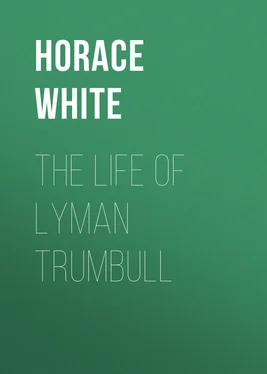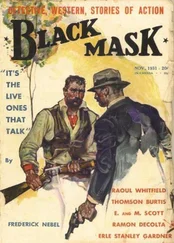Horace White - The Life of Lyman Trumbull
Здесь есть возможность читать онлайн «Horace White - The Life of Lyman Trumbull» — ознакомительный отрывок электронной книги совершенно бесплатно, а после прочтения отрывка купить полную версию. В некоторых случаях можно слушать аудио, скачать через торрент в формате fb2 и присутствует краткое содержание. Жанр: foreign_prose, История, foreign_edu, foreign_antique, на английском языке. Описание произведения, (предисловие) а так же отзывы посетителей доступны на портале библиотеки ЛибКат.
- Название:The Life of Lyman Trumbull
- Автор:
- Жанр:
- Год:неизвестен
- ISBN:нет данных
- Рейтинг книги:5 / 5. Голосов: 1
-
Избранное:Добавить в избранное
- Отзывы:
-
Ваша оценка:
- 100
- 1
- 2
- 3
- 4
- 5
The Life of Lyman Trumbull: краткое содержание, описание и аннотация
Предлагаем к чтению аннотацию, описание, краткое содержание или предисловие (зависит от того, что написал сам автор книги «The Life of Lyman Trumbull»). Если вы не нашли необходимую информацию о книге — напишите в комментариях, мы постараемся отыскать её.
The Life of Lyman Trumbull — читать онлайн ознакомительный отрывок
Ниже представлен текст книги, разбитый по страницам. Система сохранения места последней прочитанной страницы, позволяет с удобством читать онлайн бесплатно книгу «The Life of Lyman Trumbull», без необходимости каждый раз заново искать на чём Вы остановились. Поставьте закладку, и сможете в любой момент перейти на страницу, на которой закончили чтение.
Интервал:
Закладка:
Horace White
The Life of Lyman Trumbull
PREFACE
A few years since, the widow of Lyman Trumbull requested me to write a biography of her husband, who was United States Senator from Illinois during the three senatorial terms 1855-1873, or to recommend some suitable person for the task. It had been a cause of surprise and regret to me that the name of Trumbull had not yet found a place in the swelling flood of biographical literature that embraces the Civil War period. Everybody, North or South, who stood on the same elevation with him, everybody who exercised influence and filled the public eye in equal measure with him, had found his niche in the libraries of the nation, and such place in the hearts of the people as his merits warranted. Trumbull alone had been neglected. I reflected upon the matter and came to the conclusion that, although better writers than myself could be found for this kind of work, no one was likely to be found who had been more intimate with him during his whole senatorial career, or who had warmer sympathy for his aims or higher admiration for his abilities and character. I reflected also that very soon there would be no person living possessing these special qualifications. Accordingly I decided to undertake the work.
Mrs. Trumbull placed in my hands several thousand letters received by Trumbull, and a few written by him, during his public career. All these have been examined by me, and they are now in the Library of Congress. He was not in the habit of keeping copies of letters written by himself unless he deemed them important, and such copies were generally written out by his own hand, not taken in a copying-press. Other letters written by him have been sought with varying success in the hands of his correspondents, or their heirs, in various parts of the country, but nothing has been found in this way that can be considered of much importance.
During the Reconstruction era I had sustained the policy of Congress in opposition to that of Andrew Johnson, but had revolted at the carpetbaggery and misgovernment which had ensued, and had abhorred the "Ku-Klux" bills and "Force" bills which the Union party for a long time continued to enact or threaten. I was not quite prepared to find, however, upon going over the whole ground again, that I had been wrong from the beginning, and that Andrew Johnson's policy, which was Lincoln's policy, was the true one, and ought never to have been departed from. This is the conclusion to which I have come, after much study, in the evening of a long life. This does not mean that all of the doings and sayings of President Johnson were wise and good, but that I believe him to have been an honest man, a true patriot, and a worthy successor of Lincoln whose Reconstruction policy he followed. Lincoln himself could not have carried that policy into effect without a fight, and many persons familiar with the temper of the time think that even he would have failed. All that we can now affirm is that he was armed with the prestige of victory and the confidence of the North, and hence would have been better prepared than Johnson was for meeting the difficulties that sprang up at the end of the war. It must be admitted, however, that Johnson honestly aimed to carry out that policy, both because it was Lincoln's and because he himself, after careful consideration, esteemed it sound.
I acknowledge my indebtedness to the Diary of Gideon Welles , which I regard as the most important contribution to the history of the period of which it treats that has yet been given to the public. The history of Mr. James Ford Rhodes I have found to be an invaluable guide, as to both facts and judgments of men and things. I am indebted to Professor William A. Dunning, of Columbia University, for valuable suggestions, criticism, and encouragement, as well as for the assistance derived from his admired writings on Reconstruction. Miss Katherine Mayo has lightened my labors greatly by her intelligent and indefatigable search of old letters and newspaper files and by interviews with persons still living. My gratitude is due also to the late William H. Lambert, of Philadelphia, for giving me access to his collection of manuscript correspondence that passed between Lincoln and Trumbull prior to the inauguration of the former as President; also to Dr. William Jayne, of Springfield, Illinois, to Hon. J. H. Roberts, of Chicago, to the wife of Walter Trumbull (now Mrs. L. C. Pardee, of Chicago), and to Mrs. Mary Ingraham Trumbull, of Saybrook Point, Connecticut.
H. W.
INTRODUCTION
Events in the year 1854 brought into the field of national politics two members of the bar of southern Illinois who were destined to hold high places in the public councils—Abraham Lincoln and Lyman Trumbull. They were members of opposing parties, Lincoln a Whig, Trumbull a Democrat. Both were supporters of the compromise measures of 1850. These measures had been accepted by the great majority of the people, not as wholly satisfactory, but as preferable to never-ending turmoil on the slavery question. There had been a subsidence of anti-slavery propagandism in the North, following the Free Soil campaign of 1848. Hale and Julian received fewer votes in 1852 than Van Buren and Adams had received in the previous election. Franklin Pierce (Democrat) had been elected President of the United States by so large a majority that the Whig party was practically killed. President Pierce in his first message to Congress had alluded to the quieting of sectional agitation and had said: "That this repose is to suffer no shock during my official term, if I have the power to avert it, those who placed me here may be assured." Doubtless the Civil War would have come, even if Pierce had kept his promise instead of breaking it; for, as Lincoln said a little later: "A house divided against itself cannot stand."
It was not at variance with itself on the slavery question solely. In fact, the North did not take up arms against slavery when the crisis came. A few men foresaw that a war raging around that institution would somehow and sometime give it its death-blow, but at the beginning the Northern soldiers marched with no intention of that kind. They had an eye single to the preservation of the Union. The uprising which followed the firing upon Fort Sumter was a passionate protest against the insult to the national flag. It betokened a fixed purpose to defend what the flag symbolized, and it was only slowly and hesitatingly that the abolition of slavery was admitted as a factor and potent issue in the Northern mind.
It is true that the South seceded in order to preserve and extend slavery, but it was penetrated with the belief that it had a perfect right to secede—not merely the right of revolution which our ancestors exercised in separating from Great Britain, but a right under the Constitution.
The states under the Confederation, during the Revolutionary period and later, were actually sovereign. The Articles of Confederation declared them to be so. When the Constitution was formed, the habit of state sovereignty was so strong that it was only with the greatest difficulty that its ratification by the requisite number of states could be obtained. John Quincy Adams said that it was "extorted from the grinding necessity of a reluctant people." The instrument itself provided a common tribunal (the Supreme Court) as arbiter for the decision of all disputed questions arising under the Constitution and laws of the United States. But it was not generally supposed that the jurisdiction of the court included the power to extinguish state sovereignty. 1 1 Mr. H. C. Lodge, in his Life of Daniel Webster , says, touching the debate with Hayne in 1830: "When the Constitution was adopted by the votes of states at Philadelphia, and accepted by the votes of states in popular conventions, it is safe to say that there was not a man in the country, from Washington and Hamilton, on the one side, to George Clinton and George Mason, on the other, who regarded the new system as anything but an experiment entered upon by the states, and from which each and every state had the right to peaceably withdraw, a right which was very likely to be exercised.
Интервал:
Закладка:
Похожие книги на «The Life of Lyman Trumbull»
Представляем Вашему вниманию похожие книги на «The Life of Lyman Trumbull» списком для выбора. Мы отобрали схожую по названию и смыслу литературу в надежде предоставить читателям больше вариантов отыскать новые, интересные, ещё непрочитанные произведения.
Обсуждение, отзывы о книге «The Life of Lyman Trumbull» и просто собственные мнения читателей. Оставьте ваши комментарии, напишите, что Вы думаете о произведении, его смысле или главных героях. Укажите что конкретно понравилось, а что нет, и почему Вы так считаете.












